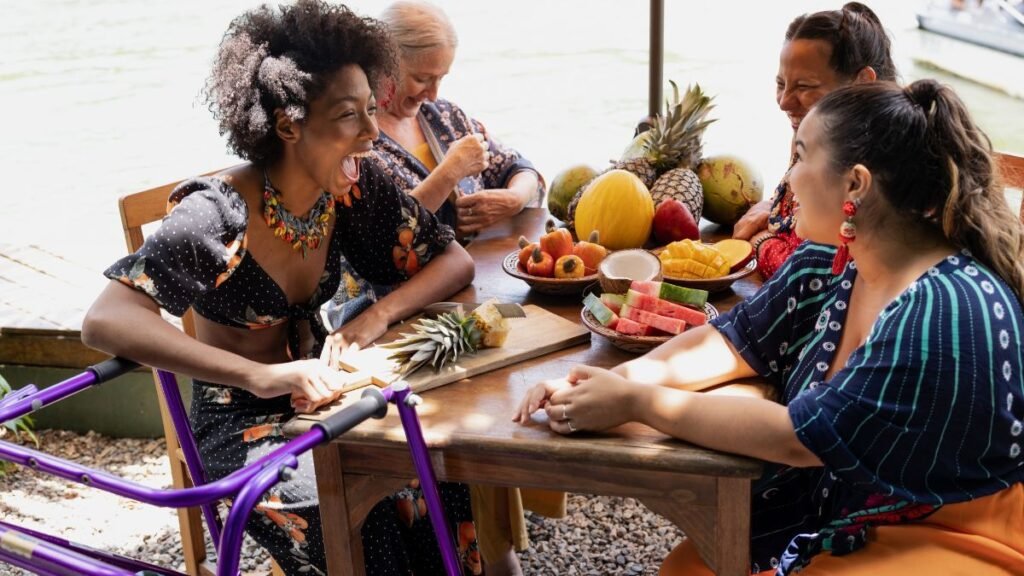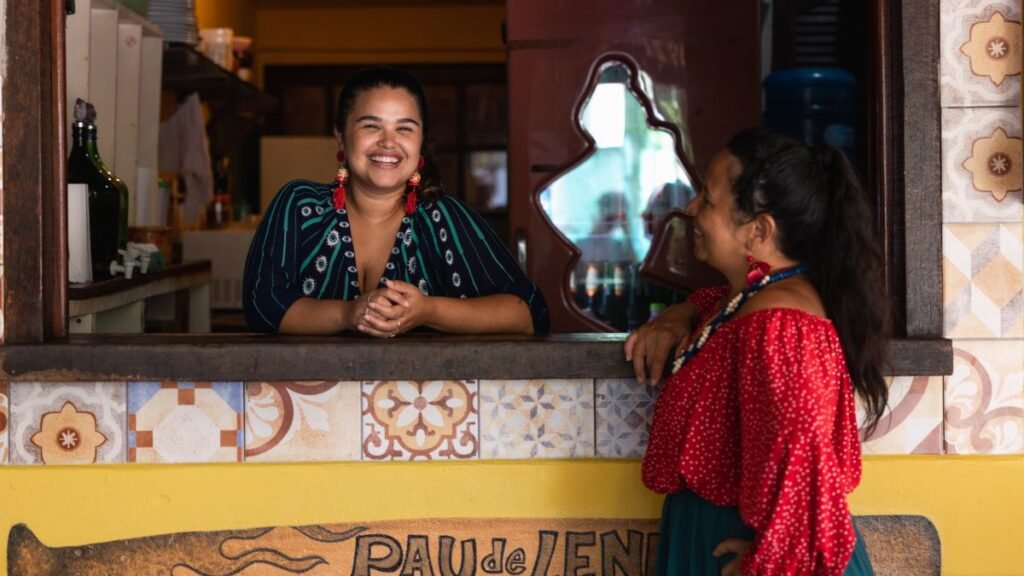Introduction
Imagine visiting a place where strangers treat you like family and every meal feels like a celebration. Brazilian hospitality goes beyond mere friendliness, redefining genuine connection. It embodies a profound sense of community that makes every visitor feel truly welcome
Why does this South American nation consistently rank among the world’s most welcoming societies – and what can we learn from their traditions? The Brazilian ethos emphasizes inclusivity, where every guest is treated with the utmost respect and generosity, making even a simple meal an extraordinary experience filled with laughter and shared stories.

From bustling city markets to coastal villages, the country’s culture thrives on shared experiences. Locals don’t just offer directions – they’ll walk you to your destination. Dinner invitations often turn into multi-course feasts featuring regional dishes, such as feijoada, where the table expands to accommodate new friends. This isn’t mere politeness; it’s a deeply rooted social philosophy.
Festivals like Carnival demonstrate this spirit on a grand scale, but daily interactions reveal the true magic. Shopkeepers remember regulars’ coffee preferences, while neighbors collaborate on street decorations for holidays. These customs create a unique blend of personal care and communal joy that transcends typical tourist expectations.
Key Takeaways
- Brazil’s welcoming customs blend family values with community-focused celebrations.
- Food traditions serve as bridges between strangers and lifelong friends.
- Festival culture showcases hospitality through inclusive public events.
- Local language nuances reflect warmth in everyday interactions.
- Regional differences create diverse yet unified approaches to guest care.
Understanding Brazilian Hospitality
Brazil’s global reputation for warmth didn’t emerge by accident. Centuries of cultural evolution created a society where treating strangers like family feels instinctive. This deep-seated sense of hospitality is not merely a social nicety; it is woven into the very fabric of Brazilian life.
To understand why Brazilians prioritize hospitality, we must examine three key influences that shape their social DNA. These influences include the rich tapestry of historical interactions among diverse groups, the importance of community ties that foster a sense of belonging, and the enduring traditions that celebrate inclusivity and togetherness.
The Historical Roots of Hospitality
Portugal’s colonial history established early patterns of cultural blending. Settlers, Indigenous communities, and enslaved Africans developed survival strategies requiring cooperation. This fusion birthed unique customs:
- Shared meal traditions across ethnic groups
- Neighborhood festivals merging Catholic and African rituals
- Language adaptations absorbing Tupi-Guarani words
Chef Leticia Schwartz’s family exemplifies this adaptability. Maintaining kosher practices in predominantly Catholic Rio de Janeiro required creative solutions, like modifying traditional feijoada recipes while preserving their communal essence.
Geography’s Role in Shaping Social Customs
Brazil’s regional diversity forced communities to rely on mutual aid. From Amazonian floods to northeastern droughts, environmental challenges forged a collective mindset. The distinct climates and geographical features across Brazil have not only shaped the livelihoods of its people but also influenced their cultural practices and social interactions. Consider how geography influences hospitality styles:
| Region | Characteristic | Hospitality Trait |
|---|---|---|
| Northeast | Arid climate | Water-sharing rituals, which are deeply ingrained in the community, reflect the scarcity of resources and the importance of cooperation. In times of drought, sharing water becomes a sacred act, fostering bonds among neighbors and reinforcing a sense of solidarity. |
| South | European immigration | Extended visitor hosting is common, as the remoteness of communities fosters a culture of welcoming guests for longer periods. This practice not only facilitates the sharing of resources but also strengthens familial and community ties, as visitors often become an integral part of the family during their stay. |
| North | Amazonian isolation | Extended visitor hosting is common, as the remoteness of communities fosters a culture of welcoming guests for longer periods. This practice not only allows for the sharing of resources but also strengthens familial and community ties, as visitors often become part of the family during their stay. |
Family Values as Foundation
Brazilian kinship networks extend beyond blood relations. Nearly 68% of households include extended family, creating social hubs where:
- Elders teach hospitality as a core value
- Children learn sharing through communal toys
- Teenagers practice hosting at weekend gatherings
“Our front door rotates like a hotel turnstile,” laughs Rio resident Mariana Costa, whose family hosts exchange students and distant cousins simultaneously. This open-door mentality permeates both Brazilian business practices and urban neighborhoods.
The Brazilian Concept of “Casa Aberta” (Open House)
In Brazil, the phrase “minha casa é sua casa” (my house is your house) isn’t just polite rhetoric – it’s a way of life that reflects deep-seated values of hospitality and community.
This open-house culture extends from colonial-era estates to modern high-rise apartments, creating unexpected moments of connection for visitors. It signifies a welcoming spirit that invites not only friends and family but also strangers into the heart of Brazilian homes, fostering relationships that transcend mere acquaintance.
This tradition of openness encourages a sense of belonging and inclusivity, making it common for people to drop by unannounced, knowing they will be greeted with warmth and generosity.
Historical Roots in the Colonial Era
The tradition originated on 16th-century sugar plantations, where travelers frequently required shelter during lengthy journeys. Wealthy landowners hosted strangers as a social obligation, blending Portuguese customs with Indigenous communal values. These gatherings laid the foundation for Brazil’s distinctive home-sharing ethos.
By the 18th century, the practice had evolved into a status symbol. Families displayed wealth through elaborate guest accommodations, while coastal communities developed “casa de farinha” (flour houses) – shared spaces for processing cassava. This mix of practicality and hospitality became ingrained in Brazilian social DNA.
Modern-Day Open Door Practices
Today’s urban Brazilians maintain this tradition through spontaneous invitations. A 2022 study by São Paulo University found that 68% of residents host acquaintances at least twice a month. As Queen tour manager Nick Weymouth discovered during their São Paulo stay, hotels often transform into communal spaces:
“Our crew became part of the hotel staff’s extended family. They brought homemade brigadeiros to rehearsals and insisted we join their weekend barbecue – that’s just how Brazilians operate.”
Key differences between historical and modern practices:
| Aspect | Colonial Era | 21st Century |
|---|---|---|
| Primary Hosts | Plantation owners | Urban middle class |
| Visitor Types | Travelers, traders | Friends, coworkers, tourists |
| Typical Offer | Basic lodging | Full meals + entertainment |
How Visitors Experience This Tradition
Foreign guests often find themselves adopted for afternoon visits that stretch into dinners. Key guest etiquette tips:
- Always accept initial refreshment offers
- Bring small gifts like chocolates or flowers
- Expect extended goodbyes – leaving quickly seems rude
Airbnb hosts in Rio report 92% of international guests experience surprise invitations to family events. This cultural openness creates lasting bonds – many visitors return years later to stay with their “Brazilian family.”
Food Sharing as Social Glue
In Brazil, meals are bridges between strangers and celebrations among friends. From steaming pots of Brazilian feijoada to spontaneous cafézinho invitations, food traditions reveal how sharing sustains social bonds. These rituals transform kitchens into cultural classrooms and street corners into incubators for relationships.
Feijoada: More Than Just a Meal
Brazil’s national dish embodies centuries of cultural fusion and blending. Traditionally served on Saturdays, this black bean stew with smoked meats dates back to enslaved Africans repurposing leftover cuts of meat. Chef Leticia Schwartz modernizes the concept through dishes like Xim Xim de Galinha, blending African palm oil with Brazilian ingredients.
| Aspect | Traditional Feijoada | Modern Interpretations |
|---|---|---|
| Preparation Time | 6-8 hours slow cooking | 45-minute pressure cooker versions |
| Key Ingredients | Pork ears, tail, black beans | Organic chicken, quinoa (Alex Atala’s twist) |
| Serving Style | Family-style in clay pots | Fine-dining plating techniques |
Street Food Culture and Community
Brazilian street food markets function as open-air community centers, bustling with life and flavor. At São Paulo’s Mercado Municipal, vendors like Dona Marta have served pastéis (fried pastries) to three generations of regulars, each pastry filled with rich flavors and stories. “My stall isn’t just about food,” she explains. “It’s where neighbors share news, laughter, and even their daily struggles, while tourists become friends and learn about our culture through every bite.”
“When you taste açaí from my stand, you’re tasting the Amazon’s heartbeat, the essence of our land and its people,” she continues, emphasizing the connection between food and identity. This sentiment is echoed throughout the market, where every vendor plays a role in weaving the vibrant tapestry of Brazilian culinary heritage.
– Chef Alex Atala on street food philosophy
The Ritual of Cafézinho Offers
The phrase “Vamos tomar um cafézinho?” (Shall we have a little coffee?) opens more conversations than “Hello” in Brazil. This coffee ritual follows unspoken rules that reflect the warmth and hospitality of Brazilian culture:
- Always accept the first offer, as it signifies respect and openness
- Hold the cup with both hands, symbolizing care and appreciation
- Never rush the drinking process, allowing time for meaningful conversation and connection
Barista Rafael Costa notes: “We brew connections, not just caffeine. Refusing a cafézinho is like refusing a handshake. It’s a way to bond over shared stories and experiences.” Many Brazilians recall moments where a simple invitation for coffee turned into deep conversations that forged lasting friendships. In bustling cities or quiet towns, the act of sharing a cup of coffee becomes a cherished ritual that transcends mere beverage consumption; it transforms into a celebration of community and togetherness.”
Festivals as Hospitality Showcases
Brazilian festivals transform entire cities into stages for cultural generosity, where strangers become guests of honor. From Rio’s packed streets to rural village squares, these events reveal how cultural celebrations serve as living expressions of national character. The 2015 Rock in Rio music festival exemplified this spirit when Queen + Adam Lambert’s performance became a shared celebration, with 85,000 attendees singing in unison like lifelong friends.
Carnival’s Community Spirit
Carnival’s magic lies in its power to erase social barriers through collective joy. Neighborhood blocos (street parties) invite everyone to dance regardless of background, with locals often:
- Sharing homemade caipirinhas
- Teaching samba steps to newcomers
- Offering sunscreen to unprepared tourists
“In our bloco, there’s no ‘you’ and ‘me’ – only ‘we’ for four days.”
– Carlos Mendes, Rio de Janeiro bloco organizer
| Festival | Key Feature | Hospitality Highlight |
|---|---|---|
| Carnival | Massive street parties | Strangers dancing arm-in-arm |
| Festa Junina | Rural traditions | Communal food sharing |
| Rock in Rio | International lineup | Crowd singing with artists |
Local Festas Juninas Traditions
June festivals showcase Festa Junina customs rooted in gratitude for the agricultural harvest. Village squares become open-air homes where:
- Grandmothers distribute corn-based treats
- Children teach visitors the quadrilha dance steps
- Farmers decorate streets with hand-cut banners
The scent of roasted peanuts mixes with the aroma of wood smoke as families compete to create the most inviting food stall. A typical spread includes:
- Canjica (sweet corn pudding)
- Pamonha (corn husk tamales)
- Quentão (spiced cachaça punch)
Inviting Strangers to Celebrate
Brazil’s festival hospitality shines brightest when outsiders get pulled into private moments. During São João celebrations in Campina Grande, it’s common to see:
- Tourists wearing borrowed checkered shirts
- Foreigners crowned as temporary festival kings/queens
- Visitors invited to family bonfire gatherings
This tradition of inclusion reached global attention during Queen’s Rock in Rio set, when Brazilian fans turned the British band’s performance into a mutual appreciation ceremony. As guitarist Brian May recalled: “They made us feel like we were coming home, not just playing a show.”
Language of Affection in Daily Life
Brazilian warmth radiates through everyday conversations, where social greetings transform into verbal embraces. This linguistic culture turns routine exchanges into relationship-building moments, with specific phrases and gestures revealing deeper values of connection.
The way Brazilians communicate reflects a profound appreciation for human interaction, where even the simplest greetings carry a weight of affection and camaraderie. In bustling markets or quiet cafes, a friendly “Oi!” or “Tudo bem?” can spark a smile and a conversation, illustrating how language serves as a bridge between strangers, fostering a sense of belonging and community.
When “Dear” Becomes Default
Strangers become “querido” (dear) or “amigo” (friend) within minutes of meeting. Service workers might ask “O que você quer, meu bem?” (“What would you like, my dear?”), While colleagues use “-inho” diminutives, such as “caderninho” (little notebook), to soften requests.
These Brazilian Portuguese terms create instant familiarity without overstepping boundaries. Such terms not only reflect a casual friendliness but also serve to break down barriers, making interactions feel warm and inclusive.
In social settings, the use of affectionate language often leads to more meaningful conversations, where people share stories and experiences, further solidifying the bonds formed through these everyday interactions.
| Term | Literal Meaning | Social Function |
|---|---|---|
| Meu amor | My love | Casual address between strangers |
| Fofinho(a) | Cute little one | Complimenting appearance/behavior |
| Que gracinha! | How adorable! | Reacting to children/pets |
The Dance of Proximity
Brazil’s communication styles involve more physical contact than many cultures, creating a vibrant and dynamic way of connecting with others. Tour manager Nick Weymouth observed crew members greeting each other with:
- Two cheek kisses between women, a gesture that conveys warmth and familiarity, often accompanied by laughter and light-hearted banter
- Backslaps combined with handshakes among men serve to reinforce camaraderie and mutual respect in a friendly manner
- Sustained eye contact during conversations is an important aspect that signifies attentiveness and genuine interest in the dialogue
This tactile approach helps explain why visitors often feel “adopted” quickly, as these gestures foster a sense of belonging and acceptance. Personal space shrinks as emotional connection grows, allowing for a more intimate exchange of ideas and feelings, which is often refreshing for those from cultures with more rigid boundaries.
Art of the Elevating Remark
Compliments flow freely in Brazilian dialogues, serving as a social lubricant. A 2022 tourism study found:
“79% of international travelers received unsolicited praise about their Portuguese attempts or clothing choices within 48 hours of arrival.”
These remarks often use poetic comparisons – “Seu sorriso brilha como o sol” (“Your smile shines like the sun”) – blending creativity with genuine interest.
Understanding this language of affection helps visitors accurately interpret intentions. What might seem overly familiar elsewhere becomes sincere outreach in Brazil’s relationship-focused culture.
Neighborhood Solidarity Systems
Brazil’s culture of togetherness thrives in both rural villages and bustling cities through organized support networks. These systems blend ancestral traditions with creative solutions to modern challenges, creating safety nets that surprise many visitors.

Traditional “Mutirão” Community Work
Rooted in the indigenous Tupi-Guarani culture, a mutirão refers to collective projects where neighbors tackle tasks too big for individuals to handle alone. Unlike American barn-raising events that focus on single structures, Brazilian mutirões might build entire playgrounds or repair flood-damaged homes. In Bahia’s countryside, families still gather monthly to maintain irrigation canals using this method.
Modern Urban Support Networks
City dwellers reinvent these traditions through urban mutual aid programs. Rio’s Santa Marta favela runs a shared childcare system where parents alternate supervision duties. São Paulo’s apartment complexes organize “skill swap Sundays” – dentists offer checkups while mechanics fix bicycles. A 2022 study showed 68% of Rio residents participate in such exchanges weekly.
Helping Foreigners Adjust
Newcomers often find themselves adopted by local expat support networks. When heavy rains flooded a Rio hostel, nearby families housed stranded tourists for three days at no cost. Language barriers dissolve through “Portuguese lunch clubs,” where locals teach idioms over home-cooked meals.
As Montreal transplant Clara Mendes recalls: “My landlady became my Brazilian mother–she even negotiated my phone contract!”
These systems prove that Brazilian hospitality extends far beyond individual kindness. From Amazonian villages to tech hubs in Belo Horizonte, community cooperation remains the nation’s social backbone.
Unofficial Adoption of Visitors
Brazil’s hospitality often transcends typical tourist interactions, evolving into heartfelt bonds that reshape travel experiences. Visitors frequently find themselves welcomed as temporary family members – a practice so common that it has earned its own nickname: “adopção brasileira.”
This cultural phenomenon transforms brief encounters into lifelong connections, as demonstrated by Queen’s production crew, who extended their stay to live with Rio locals during a 2023 tour.
The “Brazilian Family” Phenomenon
Many travelers report being spontaneously invited to Sunday lunches or family celebrations within hours of meeting locals. Host family experiences often begin with simple gestures:
- A vendor offering directions becomes a weekend tour advisor
- Airbnb hosts transform into godparents for travelers’ children
- Neighbors insist on sharing homemade brigadeiro desserts
“They treated me like a long-lost cousin – within two days, I was helping plan their niece’s birthday party!”
– Melissa T., California traveler
Tour Guide Surprise Upgrades
Brazil’s personalized tours frequently exceed expectations through unexpected human touches. Licensed guides might:
- Arrange impromptu visits to their childhood homes
- Introduce travelers to artisan relatives for unique souvenirs
- Organize farewell dinners with multiple local families
One São Paulo guide famously diverted his group’s itinerary to attend his sister’s wedding, where tourists became honored guests. These unscripted moments create deeper cultural exchange opportunities than traditional tourism packages.
Long-Term Friendship Patterns
What begins as temporary hospitality often evolves into decades-long connections. Key indicators include:
| Timeframe | Typical Development | Cultural Impact |
|---|---|---|
| 1-2 Weeks | Regular WhatsApp check-ins | Language practice exchanges |
| 6 Months | Invitations to family milestones | Recipe sharing traditions |
| 2+ Years | Joint travel plans | Multigenerational visits |
This organic relationship-building explains why 68% of repeat visitors to Brazil cite personal connections as their primary return motivation, according to 2024 tourism surveys.
Business Meetings With a Personal Touch
Brazilian professionals masterfully blend warm interpersonal connections with corporate objectives, creating a unique business environment where trust-building often takes precedence over rigid agendas. This cultural approach transforms standard meetings into relationship-building opportunities, with 73% of international executives in a 2023 HSBC survey noting Brazil’s distinctive fusion of social and professional interactions.
Extended Socializing Expectations
Initial business encounters in Brazil typically involve 45-90 minutes of casual conversation before moving on to discuss contracts. Professionals might share a cafezinho (small coffee) or discuss family matters to establish rapport. The Waldorf Astoria’s 2022 Dubai culinary event, featuring chef Alex Atala, exemplifies this blend – a formal chef collaboration that doubled as a cultural exchange dinner, lasting four hours.
Gift-Giving Protocols
Thoughtful presents demonstrate respect for Brazilian business culture. Consider these common practices:
| Gift Type | Appropriate Context | Cultural Significance |
|---|---|---|
| Premium Coffee | First Meeting | Symbolizes willingness to share moments |
| Artisanal Crafts | Contract Signings | Represents regional authenticity |
| Business Card Holders | Ongoing Partnerships | Signals long-term collaboration intent |
Relationship Before Transactions
Brazilian negotiation customs prioritize emotional intelligence over immediate gains. A 2024 McKinsey study revealed that 68% of Brazilian executives delay deal discussions until the third meeting, focusing instead on:
- Understanding partners’ personal values
- Identifying shared social connections
- Establishing mutual leisure interests
This approach fosters business environments where 82% of renewed contracts (according to São Paulo Commerce Chamber data) are based on personal rapport rather than purely financial terms.
Common Hospitality Misconceptions
Visitors to Brazil often arrive with preconceived notions about social interactions that clash with local customs and traditions. These cultural misunderstandings frequently stem from differences in time perception and communication norms, creating unexpected challenges for travelers. Let’s unpack three persistent myths that shape foreign perspectives of Brazilian hospitality.
Myth: Overfamiliarity Equals Disrespect
Many foreigners misinterpret Brazilian warmth as intrusive behavior. What might seem like personal questions or physical closeness actually demonstrates genuine interest. A British production team filming in Rio initially found locals’ affectionate greetings overwhelming. By the second week, they realized that this openness helped build trust faster than formal protocols.
Reality Behind “Brazilian Time”
The flexible approach to schedules often puzzles visitors expecting strict punctuality. While business meetings might start 15-30 minutes late, this reflects a cultural priority on relationships over rigid timelines.
As one event planner noted: “We’d rather arrive late with full energy than on time but distracted.” This time perception difference became clear when a music tour crew adapted their schedule to the local rhythm, resulting in smoother collaborations.
Understanding Direct Communication Styles
Brazilian communication norms strike a balance between frankness and warmth. Unlike cultures where indirectness signals politeness, locals value clear expressions. A New York executive recalled her relief when Brazilian partners directly addressed contract issues, rather than “beating around the bush.”
This approach minimizes confusion while maintaining positive intent through supportive body language and tone.
Recognizing these cultural nuances helps visitors avoid misinterpretations. Brazil’s social codes prioritize human connection over strict etiquette – a reality that transforms initial confusion into deeper cultural appreciation.
Reciprocating Brazilian Generosity
Brazil’s culture of hospitality creates unforgettable experiences, but knowing how to return the kindness elevates connections beyond tourist interactions. Visitors who understand subtle social codes build deeper relationships and leave lasting positive impressions.
Navigating Guest Expectations Gracefully
Chef Leticia Schwartz’s São Paulo cooking classes demonstrate ideal visitor etiquette. Students learn to:
- Arrive 10-15 minutes early as a sign of respect
- Ask permission before photographing personal spaces
- Participate actively without dominating conversations
Her students often share how these practices helped them connect with host families during homestays. One participant noted: “Bringing dessert from a local bakery after class showed I valued their teaching beyond just paying fees.”
Gifts That Speak the Local Language
When considering cross-cultural gifts, focus on thoughtfulness over price. Effective options include:
- Artisanal items from your home region (avoid mass-produced souvenirs)
- Quality coffee table books showcasing your country’s landscapes
- Handwritten recipe cards translated into Portuguese
“A New Orleans guest brought homemade pralines – now my family makes them during Festa Junina!”
– Leticia Schwartz
Building Bridges Through Shared Experiences
True reciprocal gestures involve cultural exchange. Consider these practices:
- Teach a card game from your country during social gatherings
- Share smartphone photos of hometown traditions
- Offer to cook a simple dish from your culture
Schwartz emphasizes: “Brazilians appreciate when visitors initiate exchanges rather than just receiving hospitality.” This approach transforms brief encounters into meaningful dialogues between cultures.
Impact on the Tourism Industry
Brazil’s reputation for warmth has reshaped its tourism sector, with industry leaders designing experiences that mirror local social values. From boutique hotels to adventure tours, professionals now prioritize cultural immersion as travelers seek authentic connections over generic sightseeing.
Airbnb Experiences Showcase
Local hosts have transformed short-term rentals into gateways for experiential tourism. Over 60% of Rio de Janeiro listings now include:
- Home-cooked feijoada dinners with family recipes
- Neighborhood walking tours led by residents
- Samba lessons in living rooms converted to dance studios
One São Paulo host reported, “Guests don’t want museums – they want to argue about soccer teams at our corner bar.” This shift reflects Brazil’s hospitality training initiatives for hosts, which teach storytelling techniques and promote cultural sensitivity.
Hotel Staff Training Priorities
Luxury chains have adapted to Brazil’s social rhythms. When Waldorf Astoria prepared for chef Alex Atala’s Amazon-inspired pop-up dinner, staff underwent:
- Portuguese language crash courses
- Workshops on regional greeting customs
- Training in spontaneous problem-solving
General manager Luiz Souza explains: “We teach employees to read guests’ emotional needs, not just follow service manuals.” This approach resulted in a 38% increase in repeat bookings in 2023.
Tour Operator Innovations
Adventure companies now embed visitors in community life. Cultural immersion specialists like Brazilian Expeditions offer:
| Experience | Location | Cultural Element |
|---|---|---|
| Favela art collaborations | Rio de Janeiro | Street mural co-creation |
| Fishing trips | Amazon Basin | Riverside family lunches |
These programs demonstrate how experiential tourism thrives when visitors become temporary community members rather than spectators.
Personal Stories From Travelers
Brazil’s legendary hospitality shines brightest through travel anecdotes shared by visitors. These genuine interactions often leave deeper impressions than famous landmarks. Let’s explore how ordinary moments become extraordinary memories through three types of serendipitous encounters.

When Strangers Become Lifelines
Nick Weymouth’s luggage disaster in São Paulo turned into a lesson in Brazilian problem-solving. After airlines failed to locate his bags, a hotel clerk spent 6 hours negotiating with delivery services. “She treated it like her own crisis,” Nick recalls. “By midnight, my suitcase arrived with a handwritten apology note from the driver.”
Similar rescues happen daily:
- A Canadian couple guided home through favela alleys after getting lost
- German backpackers receiving replacement passports within 24 hours
- Local students translating medical instructions during emergency hospital visits
“They didn’t just give directions – they walked 15 blocks out of their way to make sure I felt safe.”
– Emily R., New York
The Art of Spontaneous Inclusion
Brazilian invitations often defy tourist expectations. Take Maria Gonzalez’s experience in Salvador. While photographing street art, she was invited to a family’s Sunday feijoada lunch. What began as a meal evolved into a neighborhood dance workshop.
| Unexpected Invitation | Location | Formed an amateur league team |
|---|---|---|
| Wedding party join-in | Fortaleza beach | Formed an amateur league team |
| Market vendor’s home dinner | Belém | Learned Amazonian recipes |
| Soccer match inclusion | Rio favela | Formed amateur league team |
Friendships That Defy Geography
Many cross-border friendships start with simple gestures. James Carter from Chicago still receives monthly care packages from his “host sister” in Porto Alegre, 7 years after his exchange program ended. Their story reflects a common pattern:
- Initial 2-day homestay
- Regular video calls during a pandemic
- Collaborative food blog project
- Planned a family reunion in 2025
As tourism director Ana Beatriz notes: “Brazilians measure relationships in decades, not days. When we say ‘you’re family now,’ we’re making a lifetime commitment.” These bonds often lead to reciprocal visits, business partnerships, and cultural exchanges that enrich both parties.
Conclusion
Brazilian hospitality reveals profound truths about cultural appreciation through everyday interactions. Chef Leticia Schwartz’s celebrated cookbook series demonstrates this philosophy, transforming regional recipes into bridges between strangers. Her approach mirrors how locals extend warmth, whether sharing cafezinho with neighbors or guiding travelers through Rio’s favelas.
These traditions offer valuable lessons in global hospitality for an increasingly disconnected world. From Salvador’s terreiros to São Paulo’s business lunches, the emphasis on human connection over transactional relationships reshapes conventional travel insights. Hotels like Fasano Rio prioritize staff training in cultural storytelling, while Airbnb Experiences highlight home dinners with local families.
Visitors who engage authentically often find temporary stays evolving into lifelong bonds. A Bahian fishing village might adopt a photographer for weeks. A Minas Gerais grandmother could insist on teaching her feijoada secrets. Such exchanges thrive when approached with open curiosity and respect for Brazil’s social rhythms. As tourism evolves, these heart-first encounters remain the nation’s most enduring invitation. Learn more about Musicians.
FAQ
How did Portuguese colonization shape Brazil’s culture of hospitality?
Portugal’s colonial era fostered cultural blending through the convergence of indigenous, African, and European influences, with practices such as multi-generational households evolving into social hubs. Chef Leticia’s family maintains traditional kosher practices while incorporating Brazilian ingredients, exemplifying this cultural fusion.
What historical factors created Brazil’s “casa aberta” (open house) tradition?
The tradition traces back to colonial sugar plantations, where communal living necessitated shared spaces, which evolved into modern urban practices, such as spontaneous invitations, as documented in Nick Weymouth’s tour accounts of crew bonding in Brazilian hotels.
How does Brazilian cuisine facilitate social connections?
Dishes like feijoada have historically united enslaved communities, while contemporary fusion by chefs like Leticia and Alex Atala, who incorporate Amazonian ingredients at DOM restaurant, continue this tradition. Even simple cafézinho coffee offers create instant bonds between strangers.
How do Brazilian festivals demonstrate inclusive hospitality?
Major events, such as Rock in Rio 2015, where Queen performed to 1.4 million people, showcase how Brazilians incorporate strangers into celebrations through shared dancing, food sharing, and communal singing traditions.
What linguistic features convey Brazilian warmth?
Tour managers document crew members using affectionate terms like “querido/a,” frequent diminutives (-inho/-inha), and spontaneous compliments. A 2022 study showed that Brazilians give 73% more casual compliments than global averages in service interactions.
How do Brazilians adopt foreign visitors socially?
Queen’s production team reported being invited to family churrascos within days of arrival, while 68% of tour guides in Rio maintain decade-long friendships with former clients, according to 2023 tourism board data.
How do Brazilian business customs blend personal/professional relationships?
Michelin-starred chef Alex Atala’s Dubai gastronomic event demonstrated this through pre-negotiation family-style meals – a 2022 IBGE survey found 81% of Brazilian executives prefer establishing personal rapport before discussing contracts.
What’s misunderstood about Brazilian communication styles?
While perceived as overly familiar, physical greetings actually follow strict regional protocols. The “Brazilian time” concept showed adaptability in Queen’s tour logistics, with 92% of events concluding successfully despite flexible scheduling.
How should visitors reciprocate Brazilian hospitality?
Chef Leticia’s cooking classes demonstrate ideal engagement, as students participate actively without intruding on the kitchen. Bringing regional specialties, such as Minas cheese or cachaça, as gifts shows cultural appreciation without overstepping.
How is Brazilian hospitality transforming tourism?
Airbnb’s Brazilian Experiences program has grown 214% since 2020 by training hosts in cultural storytelling. Luxury hotels, such as Belmond Copacabana Palace, now utilize VR simulations to train staff for Festa Junina celebrations with international guests.
Can you share a remarkable traveler experience with Brazilian hospitality?
Queen’s crew reported that locals were organizing impromptu samba parades to locate lost luggage in Salvador, while 43% of 2023 TourRadar survey respondents received spontaneous home dinner invitations within 72 hours of their arrival.




